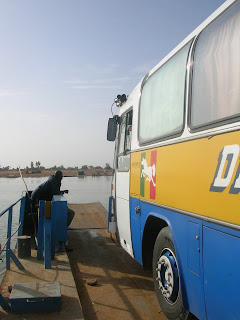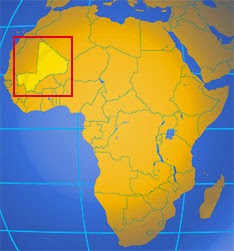So this all went down about a month ago, but I've been dealing with an impossibly slow internet connection, reeling from a series of ill-fated weekend road trips, healing from a bevy of minor but nonetheless unfortunate ailments and a indulging a raucous desire to squeeze as much fun in as possible during my last month and half in Mali.
Two other Canadians who work in a little village south of Bamako and I headed to one of West Africa's oldest towns, Djenné, for the first part of my much-needed-mid-mandate break. After barely making our 6am bus, we spent 10 hours sweating all the way to Djenné where we walked into an AMBUSH.
For the three of us, this outing was one of the first "touristy" things we did in Mali, since for the most part, our work and living in families/NGO bases/paltry salaries keep us separate from the tourists who show up in sparkling clean outdoor performance gear and air conditioned 4X4's (this is my jealousy font). To prepare for our journey, we talked to other PSIJ's who had been already, quizzed local colleagues and of course, depended greatly on what is usually the holy bible to travellers, The Lonely Planet travel guide.
LP warned us that touts/street vendors/would-be guides would be an exhausting annoyance in Mopti, but had nothing to say about Djenné on the subject. As far as we could tell, Djenné was a sleepy, mud-built town where you can view the world's biggest mud structure, eat delicious “widjila” and shop in the Monday market. We figured that we would just lounge there for two days before heading further north to Mopti to quickly pick up a guide for Dogon Country.
Djenné ended up being anything but sleepy. To our dismay, the harassment began the second we stepped off the bus and on to the ferry that takes you across the Bani, since Djenné is a kind of island. A man came up to us offering his "guide" services. We said we weren't interested, but he followed us to our hostel and hung around for 2 hours while we got settled. We opted to hear him out since we really had nothing planned for the next 2 days other than look at the mud mosque and wait for the Monday market, and Djenné's so small that within the first 2 minutes, we'd kind of already seen the mosque. He told us that he'd, take us to a Peul village by horse-cart and a Bozo village by boat, and then give us historical tour of Djenné. We "discuted" the price down to something we thought was reasonable and agreed to use his "services" and he finally left us alone. For me, he had me at the boat ride, but I'm a sucker for anything that involves being on water.
They led us through the narrow, winding labyrinth of mud-lined streets to the other end of town while we were accosted the entire way and I was even straight-up slapped by two kids. Along the way, it was impossible to overlook the poverty that surrounded us, and I was amazed that in some ways the living conditions there seemed worse than in Bamako, which is counted as one of the least livable cities in the world, and this ranking I believe is a function of its poverty.
All unfortunate observations aside, our booze-filled oasis was someone's back yard, complete with a donkey, a sheep pen that housed the biggest sheep I've ever seen and approximately 20 chickens that we saw climb into a tree at one point, our barmaid was a 12 year old girl, and our host rejected the Don Draper ways of his countrymen in a continuous-broken-English-loop that lasted for over 20 minutes. Still, we liked their company, and as always enjoyed sipping beer under the stars in January.
After capping off our first and negative impressions of Djenné with some positive ones, our "guided" excursion the next day was a miserable disappointment. As we rode across the dried up river basin, I asked him to tell us a little about the area, and he told us were in the Sahara. Um, no. In the villages, it was to be expected that the kids would mob us, but once their initial attempts to get handouts from us failed, they just wanted the usual: to play a few games, have their pictures taken, and stare at these strange people visiting their home and I enjoyed the exchanges. Nevertheless, I haven't developed the thick skin that seasoned development and aid workers seem to have, and the obvious signs of disease, malnutrition and plum, desperate poverty that these children carried broke my heart a little.
 |
| The Sahel, rather. |
Once back in Djenné, our historical tour devolved into a "shopping trip" where I'm sure he gets commission if the tourists he brings by shops "historically significant" workshops (riiiiiight) buy something. We got annoyed and asked to go to the terrace that he'd set up for us to view the mosque from and watch the sunset. The views of the mosque and the sun setting over the town were exhilarating, but short-lived, since some merchants had followed us up there with their trays of necklaces on their heads.
After going to all those troubles to find us the scarves, we figured we owed our new friend Barack his 3 cups of tea. After supper, we joined him and some friends on the rooftop once again where we listened to Celine Dion on cassette tape (LP is right about some things), stargazed and chatted with our hosts while enjoying the ritual that is drinking tea in this country. In the end, all he wanted was to give us his address so that we could be pen pals.
So Djenné is not a place to visit for the faint of heart, but worth it for its understated beauty and drinking tea with Barack if you have the good sense to accept his offer.
Now pics, next post Pays Dogon.
Non-Rooftop Fun:
 |
| Bus crossing on the Bani |
 |
| Pirogue-watching from the port. |
 |
| Moroccan style mud building. |
 |
| The underwhelming Monday Market |
 |
| Ducking out of the market to drink beside a donkey |
 | ||
| The donkey we drank beside |
Rooftop Fun
 |
| Shopping with over-persistent-necklace-selling-ladies. |
 |
| This colour brings out the two colours of my eyes. |
 |
Tuareg scarf shopping with a view. |























